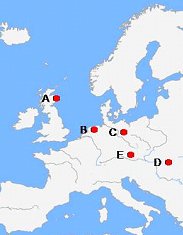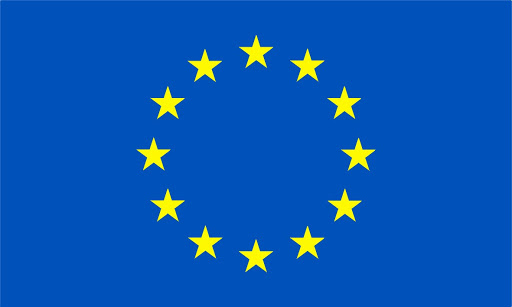The GILDED Project
The overall goal of GILDED was to identify socio-economic, cultural and political changes which could bring about a reduction in carbon-intensive energy demand from the household sector, in urban and rural communities across the EU.
GILDED was a three year collaborative research project funded through European Union Framework Seven, running from December 2008-2011. It is led by the Macaulay Institute in Aberdeen, Scotland in partnership with the Potsdam Institute for Climate Impact Research (Germany), the Centre for Social Sciences of the Hungarian Academy of Sciences (Institute of Sociology) (Hungary), the University of Groningen (the Netherlands) and the University of South Bohemia in C(eské Bude(jovice (Czech Republic).
 Study Sites
Study Sites
This research was focused on case studies of a medium sized city and its functionally associated rural area in each of the consortium members’ countries.
- Scotland: Aberdeen and Aberdeenshire
- The Netherlands: Assen and Assen Municipality
- Germany: Potsdam and Potsdam-Mittelmark
- Hungary: Debrecen and Hajdú-Bihar County
- The Czech Republic: C(eské Bude(jovice and Bude(joviceshire
Project Activities
This research wasl be undertaken by a multidisciplinary team: from sociologogists, psychologists, geographers and agent-based modellers working together to:
- Establish stakeholder advisory groups in each case study region
- Evaluate structural incentives for energy consumption in each case study region
- Develop lifestyle profiles of each case study region
- Assess in detail an energy initiative in each case study region.
- Develop an agent based modelling framework, the Community Energy Demand Social Simulator
- Develop policy recommendations for reducing energy consumption at local, national and EU levels.
The focus of the project was on household consumption as a means of understanding energy use patterns. In Europe, about 35% of all primary energy use and 40% of all greenhouse gas emissions come from private households. While technological innovations can reduce the energy requirement for specific activities, and make low-carbon energy sources economically and environmentally viable, their impact in reducing carbon-intensive energy use will depend critically on the lifestyle choices of local households. Otherwise, increases in energy efficiency may simply raise demand for energy-intensive products and services (e.g. cheaper home heating may lead to a rise in household temperature or more money spent on air travel). To permanently reduce energy consumption, low energy consumption must become a way of life.
Why is it important to do this research?
The EU has set itself the goal of being the world leader in the development of a sustainable, competitive and secure supply of renewable energy for its citizens. Scotland has set itself a goal of reducing greenhouse gas emissions by 80% by 2050. Both are aiming to develop a ‘post-carbon’ society, where greenhouse gas emissions are dramatically reduced. However, thus far technology has received far more research attention than socio-economic, cultural and political factors, and energy supply far more than energy demand in relation to this goal
There is very little recent research on factors influencing household energy use. Most studies date back to the 1970s and 1980s, when energy conservation was promoted to avoid depletion of energy sources, while at present, concerns with CO2 emissions and global warming are more important. Also, culture, technology and government policies have changed considerably in the past few decades. It is important to take such issues into account when developing and implementing policies aimed to reduce carbon energy use.
There is very little research on household level energy consumption and lifestyle choices. Most studies ask individuals about heir energy use and values, and then average or group these to represent the whole population. The problem with this is that people usually make decisions as part of a household or family group, and in reference to their peers (friends, family, coworkers etc). It is more difficult, but also more important, to look at decision-making and energy consumption at household and group levels, in order to identify policies which are likely to be successful.
Different countries in the EU have different cultures, laws, service infrastructures (e.g. options for heating, transportation, food) and climates. It is therefore important to do research in several different places, to identify which policies might work best overall, and which are more suited to particular regions or countries. There also may be important differences between countries in Eastern and Western Europe. This research is being undertaken in Western Europe (the UK and the Netherlands), Eastern Europe (the Czech Republic and Hungary) and in Germany, which has aspects of both.
What will happen with the results of this research?
GILDED researchers worked closely with policymakers throughout the research process.
- Local policy makers in each regional case study were be involved in an advisory group, which guided the research process.
- Information about local energy initiatives and research findings was be placed on the GILDED web-site (gildedeu.hutton.ac.uk).
- A series of policy briefs on GILDED findings was be circulated to advisory group members, policy makers, and placed on the GILDED web-site
- A workshop for policymakers and other stakeholders was held in each case study region, as well as a joint international workshop, was held at the end of the project, to present and discuss GILDED findings
- GILDED findings were also presented at academic conferences and in journal articles.
Publications
Journal articles
Gotts, N. M., Polhill, J. G., Craig, T. and Galan-Diaz, C. (2014) Combining diverse data sources for CEDSS, an agent-based model of domestic energy demand. Structure and Dynamics 7 (1), https://escholarship.org/uc/item/62x9p0w4.
van der Werff, E., Steg, L. and Keizer, K. (2013) The value of environmental self-identity: The relationship between biospheric values, environmental self-identity and environmental preferences, intentions and behaviour. Journal of Environmental Psychology 34, 55-63. doi: 10.1016/j.jenvp.2012.12.006
Fischer, A., Peters, V., Neebe, M., Vávra, J., Kriel, A., Lapka, M. and Megyesi B. (2012) Climate change? No, wise resource use is the issue: Social representations of energy, climate change and the future. Environmental Policy and Governance 22 (3), 161-176. doi: 10.1002/eet.1585
Steg, L., Perlaviciute, G., Van der Werff, E. and Lurvink, J. (2012) The significance of hedonic values for environmental attitudes, preferences and actions. Environment and Behavior 46 (2), 163-192. doi:
Fischer, A., Peters, V., Vávra, J., Neebe, M. and Megyesi, B. (2011) Energy use, climate change and folk psychology: does sustainability have a chance? Results from a qualitative study in five European countries. Global Environmental Change 21 (3), 1025-1034. doi: 10.1016/j.gloenvcha.2011.04.008
Books and book chapters
Lapka, M., Vávra, J., Cudlínová, E. (2012) Perceived need for change towards a more environmental society: A qualitative case from the Czech Republic. In: Cudlínová, E., Lapka, M. (eds.), Towards an environmental society? Concepts, policies, outcomes. Karolinum, Praha.
Neebe, M. and Reusswig, F. (2012) Chapter 4 Climate Protection and Civil Society: Does Effective Local Climate Policy Need the Participation and Engagement of Citizens? A Comparison Between the Cities of Potsdam and Muenster, in William G. Holt (ed.) Urban Areas and Global Climate Change (Research in Urban Sociology, Volume 12), Emerald Group Publishing Limited, pp.75-104. doi: 10.1108/S1047-0042(2012)0000012007
Kovách, I. and Gotts, N.M. (eds.) (2010) Climate change and local governance: Alternative approaches to influencing household energy consumption (a comparative study of five European regions). Studies in Political Science 3. Institute of Political Studies of Hungarian Academy of Sciences, Budapest. http://mek.oszk.hu/09300/09355/09355.pdf
See also policy briefs and project reports
Original list of publications and presentations to date (PDF)



